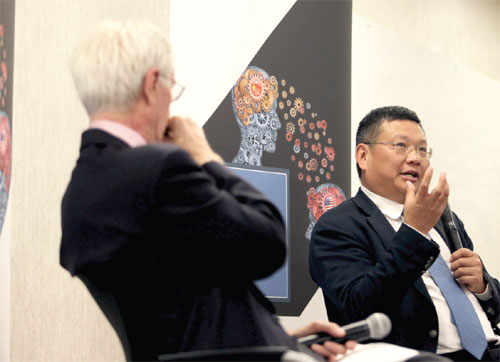As globalization rises, so will China's innovation: dean
China will become a key center for innovation in the world. So said Xiang Bing, founding dean of the Cheung Kong Graduate School of Business, during a discussion with China expert Orville Schell about China's history and future in New York.
"We were not very good at innovation in the past, but good at learning, mimicking and imitation," said Xiang. "In the past, the driver of the Chinese economy was different from that of the US. In the US, it took technology-driven companies, such as Google and Apple; but in China, most of the development came from deregulation."
"China can continue its economic development without innovation through more deregulation," he added. "It is much easier to copy than innovate and it is not hard to see that many of the successful companies in the past thrived on imitation."
According to Xiang, China still has many sectors that need to be deregulated, including financial services, telecommunications, cultural industry, sports and health care.
In the future, some of the sectors will become global and competitive, automobiles being by far the biggest market. "To survive in that market, you have to be innovative, even without being pushed by the government or anyone, because they know it very well," said Xiang.
Most of China's economic progress took place after it successfully joined the World Trade Organization in 2001. According to Xiang, China's globalization by joining the WTO, along with the information explosion pushed by the Internet, have given China a huge advantage with its huge population. The potential for innovation has been realized.
"As the world grows so globalized, when you have the market and the money, top talents have already come and more will come to China to innovate, making China a globally key center for innovation," said he.
"One of the reasons why I feel confident about the future of China is that people of my age tend to have experienced a lot and when you have experienced so much first-hand, and faced the future with so many choices, you tend to be more confident."
Xiang also believes that not everyone needs to be an innovator or entrepreneur.
"Probably our educational system is not good at 'producing' students who are truly innovative, but given the many Chinese students studying overseas and tourists traveling around the world, that might somehow be mitigated," Xiang said.
"Also, the innovation in China is not only restricted to Chinese companies and entrepreneurs doing so in the country," he added. "They also go to Silicon Valley and even scientists and entrepreneurs from other countries come to China, for example, Shenzhen of Guangdong province, where the money that can fund and help realize their dreams comes from."
xiaolixin@chinadaily.com.cn
|
Xiang Bing (right), founding dean of the Cheung Kong Graduate School of Business, and Orville Schell, Arthur Ross Director of the Center on US-China Relations at Asia Society, discuss China's economy and business culture. Han Meng / for China Daily |





















